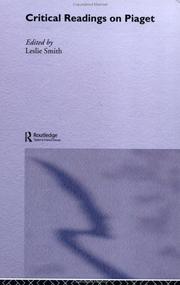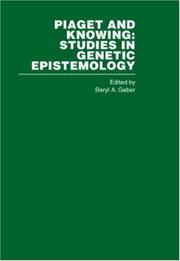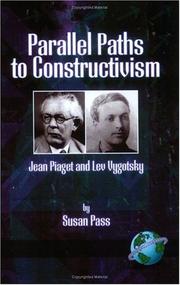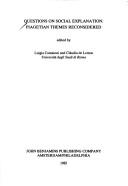| Listing 1 - 10 of 11 | << page >> |
Sort by
|
Book
ISBN: 0875866565 9780875866567 9780875860299 Year: 2015 Publisher: New York : Agathon Press,
Abstract | Keywords | Export | Availability | Bookmark
 Loading...
Loading...Choose an application
- Reference Manager
- EndNote
- RefWorks (Direct export to RefWorks)
Piaget, Jean, --- Ppiaje, --- Pʻei-ya-hsieh, --- Pʻi-ya-chieh, --- Piazhe, Zhan, --- Piaze, Zan, --- Pʻiaje, --- Piʼaz'eh, Z'an, --- Piaget, J. P. --- Pi-a-je, --- Piyajie, --- פיאז׳ה, ז׳אן --- פיאז׳ה, ז׳אן, --- Piyāzhah, Zhān, --- پياژه، ژان,

ISBN: 113478614X 1280319356 0585453640 0203435850 9780585453644 9786610319350 6610319359 9780203435854 9780415133173 0415133173 9781134786145 9781134786091 1134786093 9781134786138 1134786131 9781138006898 1138006890 9781280319358 Year: 1996 Publisher: London New York Routledge
Abstract | Keywords | Export | Availability | Bookmark
 Loading...
Loading...Choose an application
- Reference Manager
- EndNote
- RefWorks (Direct export to RefWorks)
This new collection of distinctive studies tracks developments in the most recent published work during the period 1990-95, with an integral guide and editorial commentary by Leslie Smith. A useful and compact text for students and researchers.
Knowledge, Theory of. --- Epistemology --- Theory of knowledge --- Philosophy --- Psychology --- Piaget, Jean, --- Ppiaje, --- Pʻei-ya-hsieh, --- Pʻi-ya-chieh, --- Piazhe, Zhan, --- Piaze, Zan, --- Pʻiaje, --- Piʼaz'eh, Z'an, --- Piaget, J. P. --- Pi-a-je, --- Piyajie, --- פיאז׳ה, ז׳אן --- פיאז׳ה, ז׳אן, --- Piyāzhah, Zhān, --- پياژه، ژان,

ISBN: 9781135660642 1135660646 9780415402309 0415402301 9780203715772 0203715772 9781135660789 1135660786 9781135660710 1135660719 1283967359 9781283967358 Year: 2006 Publisher: London ; New York : Routledge,
Abstract | Keywords | Export | Availability | Bookmark
 Loading...
Loading...Choose an application
- Reference Manager
- EndNote
- RefWorks (Direct export to RefWorks)
This book was first published in 1977.
Cognition. --- Genetic epistemology. --- Developmental psychology --- Knowledge, Theory of --- Psychology --- Piaget, Jean, --- Ppiaje, --- Pʻei-ya-hsieh, --- Pʻi-ya-chieh, --- Piazhe, Zhan, --- Piaze, Zan, --- Pʻiaje, --- Piʼaz'eh, Z'an, --- Piaget, J. P. --- Pi-a-je, --- Piyajie, --- פיאז׳ה, ז׳אן --- פיאז׳ה, ז׳אן, --- Piyāzhah, Zhān, --- پياژه، ژان,
Book
ISBN: 9788024623528 8024623528 9788024623252 Year: 2014 Publisher: [Prague, Czech Republic] : Karolinum,
Abstract | Keywords | Export | Availability | Bookmark
 Loading...
Loading...Choose an application
- Reference Manager
- EndNote
- RefWorks (Direct export to RefWorks)
Monografie Morální vývoj školáků a předškoláků. Paradigmatické výzvy dle Jeana Piageta představuje podrobnou analýzu výzkumu Jeana Piageta v oblasti morálního vývoje dítěte. Text je členěn do dvou oddílů. Ve své první, interpretační části nabízí náhled do Piagetovy teorie morálního vývoje dítěte s důrazem na morální výzvy, které dítě během svého vývoje přijímá a které jej „posouvají“ od egocentrické heteronomie k decentrované autonomii. Druhá, faktografická část zprostředkovává zakotvení Piagetovy teorie v empirii. Čtenáři jsou zde nabízeny k vlastní interpretaci všechny výzkumné situace, ze kterých Piagetova teorie vychází. Vývojové výzvy plynoucí z těchto situací kniha sdružuje do tří oborů uplatnění dětského morálního hodnocení: konflikty s autoritou, problematika trestání a instituce her organizovaných jako soutěž. Autor rovněž analyzuje účast dětí na tomto typu her a skutečnost, proč Piaget považoval právě tyto hry za nejvíce inspirativní pro vývoj dětského morálního hodnocení a jak toto hraní zkoumal.
Moral development. --- Preschool children. --- Preschoolers --- Children --- Ethical development --- Child psychology --- Moral education --- Faith development --- Piaget, Jean, --- Ppiaje, --- Pʻei-ya-hsieh, --- Pʻi-ya-chieh, --- Piazhe, Zhan, --- Piaze, Zan, --- Pʻiaje, --- Piʼaz'eh, Z'an, --- Piaget, J. P. --- Pi-a-je, --- Piyajie, --- פיאז׳ה, ז׳אן --- פיאז׳ה, ז׳אן, --- Piyāzhah, Zhān, --- پياژه، ژان,
Book
ISBN: 2757419129 2757403346 9782757403341 9782757419120 Year: 2011 Publisher: Villeneuve d'Ascq: Presses universitaires du Septentrion,
Abstract | Keywords | Export | Availability | Bookmark
 Loading...
Loading...Choose an application
- Reference Manager
- EndNote
- RefWorks (Direct export to RefWorks)
Après Introduction à Jean Piaget (1997) qui permettait de se familiariser avec les principaux concepts piagétiens et Inventer, compter et classer (2005) qui éclairait deux grands ouvrages piagétiens : La genèse du nombre et La genèse des structures logiques élémentaires, Annie Chalon-Blanc propose avec Piaget - Constructivisme-Intelligence - un troisième manuel qui est un pari sur l'avenir de la théorie de Jean Piaget. Deux thèmes sont susceptibles, selon elle, de passer à la postérité : le constructivisme ou comment se construit progressivement un réel intelligible et la réversibilité des actes et/ou de la pensée, source de l'intelligence. Le constructivisme, car il apporte une réponse claire et originale à la question des rôles respectifs du sujet et des objets dans l'élaboration des connaissances. La réversibilité, parce que cette capacité qu'a le sujet de se saisir des actions disparues des données perceptives et de les composer entre elles pour déduire un élément commun, en dépit de leurs disparités, reste une conception révolutionnaire de l'intelligence. Des textes brefs peu célèbres mais explicites de Jean Piaget viennent enrichir les deux thèmes retenus. L'auteur laisse délibérément de côté, ou presque, quelques notions classiques : les stades, le sujet épistémique, la filiation des structures, et autres, qui ont fait couler beaucoup d'encre au siècle dernier. L'originalité de Jean Piaget est le propos essentiel de ce manuel destiné en priorité aux étudiants en psychologie, en sciences de l'éducation et aux futurs professeurs d'école, mais aussi à tous les professeurs et éducateurs spécialisés, qui trouveront dans le rapport des expériences simples et élégantes menées à Genève, des explications possibles des retards cognitifs auxquels ils sont confrontés, et des pistes de travail de rééducation.
Cognition in children. --- Constructivism (Psychology) --- Intellect. --- Piaget, Jean, --- Human intelligence --- Intelligence --- Mind --- Ability --- Psychology --- Thought and thinking --- Cognition (Child psychology) --- Thought and thinking in children --- Child psychology --- Ppiaje, --- Pʻei-ya-hsieh, --- Pʻi-ya-chieh, --- Piazhe, Zhan, --- Piaze, Zan, --- Pʻiaje, --- Piʼaz'eh, Z'an, --- Piaget, J. P. --- Pi-a-je, --- Piyajie, --- פיאז׳ה, ז׳אן, --- Piyāzhah, Zhān, --- پياژه، ژان, --- Cognition in children --- Intellect --- Piaget, Jean, - 1896-1980 --- enseignement --- éducation --- didactique
Book
ISBN: 0674039416 9780674039414 0674272307 9780674272316 9780674272309 0674272315 067425483X Year: 2009 Publisher: Cambridge, MA
Abstract | Keywords | Export | Availability | Bookmark
 Loading...
Loading...Choose an application
- Reference Manager
- EndNote
- RefWorks (Direct export to RefWorks)
The Evolving Self focuses upon the most basic and universal of psychological problems—the individual’s effort to make sense of experience, to make meaning of life. According to Robert Kegan, meaning-making is a lifelong activity that begins in earliest infancy and continues to evolve through a series of stages encompassing childhood, adolescence, and adulthood. The Evolving Self describes this process of evolution in rich and human detail, concentrating especially on the internal experience of growth and transition, its costs and disruptions as well as its triumphs. At the heart of our meaning-making activity, the book suggests, is the drawing and redrawing of the distinction between self and other. Using Piagetian theory in a creative new way to make sense of how we make sense of ourselves, Kegan shows that each meaning-making stage is a new solution to the lifelong tension between the universal human yearning to be connected, attached, and included, on the one hand, and to be distinct, independent, and autonomous on the other. The Evolving Self is the story of our continuing negotiation of this tension. It is a book that is theoretically daring enough to propose a reinterpretation of the Oedipus complex and clinically concerned enough to suggest a variety of fresh new ways to treat those psychological complaints that commonly arise in the course of development. Kegan is an irrepressible storyteller, an impassioned opponent of the health-and-illness approach to psychological distress, and a sturdy builder of psychological theory. His is an original and distinctive new voice in the growing discussion of human development across the life span.
Developmental psychology. --- Personality change. --- Self. --- Meaning (Psychology) --- Psychotherapy. --- Psychagogy --- Therapy (Psychotherapy) --- Mental illness --- Clinical sociology --- Mental health counseling --- Psychology --- Personal identity --- Consciousness --- Individuality --- Mind and body --- Personality --- Thought and thinking --- Will --- Change in personality --- Change (Psychology) --- Development (Psychology) --- Developmental psychobiology --- Life cycle, Human --- Treatment --- Piaget, Jean, --- Ppiaje, --- Pʻei-ya-hsieh, --- Pʻi-ya-chieh, --- Piazhe, Zhan, --- Piaze, Zan, --- Pʻiaje, --- Piʼaz'eh, Z'an, --- Piaget, J. P. --- Pi-a-je, --- Piyajie, --- פיאז׳ה, ז׳אן --- פיאז׳ה, ז׳אן, --- Piyāzhah, Zhān, --- پياژه، ژان,
Book
ISBN: 1299449883 0761848746 9780761848745 9780761848721 076184872X 0761848738 9780761848738 9781299449886 Year: 2009 Publisher: Lanham, MD
Abstract | Keywords | Export | Availability | Bookmark
 Loading...
Loading...Choose an application
- Reference Manager
- EndNote
- RefWorks (Direct export to RefWorks)
This book explains a threefold thesis of a study that language influences how human beings perceive reality, that the development of theoretical constructs can help explain resistances to and possibilities for inclusive language, and that the implementation of inclusive language is an important goal for religious education.
Nonsexist language. --- Process philosophy. --- Religious education. --- Ethical education --- Theological education --- Education --- Moral education --- Change --- Philosophy --- Inclusive language --- Nonsexist writing --- Bias-free language --- Sexism in language --- Piaget, Jean, --- Whitehead, Alfred North, --- Whorf, Benjamin Lee, --- Whorf, B. L. --- וורף, בנג׳מין לי, --- Ppiaje, --- Pʻei-ya-hsieh, --- Pʻi-ya-chieh, --- Piazhe, Zhan, --- Piaze, Zan, --- Pʻiaje, --- Piʼaz'eh, Z'an, --- Piaget, J. P. --- Pi-a-je, --- Piyajie, --- פיאז׳ה, ז׳אן --- פיאז׳ה, ז׳אן, --- Nonsexist usage --- Piyāzhah, Zhān, --- پياژه، ژان,
Book
ISBN: 1280439068 0198020147 0195345444 1423740351 1602565783 9781423740353 9780195019278 019501927X 9786610439065 6610439060 9781280439063 9780198020141 9780195345445 9781602565784 0199839077 9780199839070 Year: 1975 Publisher: New York, N.Y. : Oxford U.P.,
Abstract | Keywords | Export | Availability | Bookmark
 Loading...
Loading...Choose an application
- Reference Manager
- EndNote
- RefWorks (Direct export to RefWorks)
Proposes to show how children can be prepared to develop their full potential as 'thinking' human beings. The activities or 'games' described provide a general foundation which should help the child to deal successfully with specific academic subjects. With Additional Thoughts.
Cognition in children. --- Games. --- Children --- Children's games --- Games, Primitive --- Games for children --- Pastimes --- Primitive games --- Recreations --- Entertaining --- Physical education and training --- Amusements --- Play --- Sports --- Cognition (Child psychology) --- Thought and thinking in children --- Child psychology --- Recreation --- Piaget, Jean, --- Ppiaje, --- Pʻei-ya-hsieh, --- Pʻi-ya-chieh, --- Piazhe, Zhan, --- Piaze, Zan, --- Pʻiaje, --- Piʼaz'eh, Z'an, --- Piaget, J. P. --- Pi-a-je, --- Piyajie, --- פיאז׳ה, ז׳אן --- פיאז׳ה, ז׳אן, --- Piyāzhah, Zhān, --- پياژه، ژان, --- Cognition in children --- Thought and thinking. --- Psychological aspects. --- Mind --- Thinking --- Thoughts --- Educational psychology --- Philosophy --- Psychology --- Intellect --- Logic --- Perception --- Psycholinguistics --- Self

ISBN: 1607529289 1282015818 9786612015816 9781607529286 1593111452 9781593111458 1593111460 9781593111465 Year: 2004 Publisher: Greenwich, Conn. Information Age Pub.
Abstract | Keywords | Export | Availability | Bookmark
 Loading...
Loading...Choose an application
- Reference Manager
- EndNote
- RefWorks (Direct export to RefWorks)
Educators --- Education --- Constructivism (Education) --- Cognitive-developmental theory --- Constructionism (Education) --- Constructivist education --- Piagetian theory of cognitive development --- Learning, Psychology of --- Philosophy. --- Piaget, Jean, --- Vygotskiĭ, L. S. --- Wygotski, Lew Semjonowitsch, --- Vygotsky, L. S. --- Vygotskiĭ, Lev Semenovich, --- Vygotsky, Lev Semenovich, --- Vygotskij, Lev Semenovic, --- Wigotsky, L., --- Vigotski, Lev S., --- Vigotski, L. S. --- Wei-ko-tzʻu-chi, Lieh Hsieh, --- Wygotski, L. S. --- Vygotski, Lev Sémionovitch, --- Выготский, Л. С. --- ויגוצקי, לב, --- Vigotszkij, L. Sz., --- Ppiaje, --- Pʻei-ya-hsieh, --- Pʻi-ya-chieh, --- Piazhe, Zhan, --- Piaze, Zan, --- Pʻiaje, --- Piʼaz'eh, Z'an, --- Piaget, J. P. --- Pi-a-je, --- Piyajie, --- פיאז׳ה, ז׳אן --- פיאז׳ה, ז׳אן, --- Piyāzhah, Zhān, --- پياژه، ژان, --- Vygotskii, L. S.

ISBN: 1283359162 9786613359162 9027279608 9789027279606 0915027666 9780915027668 902722546X 9789027225467 Year: 1985 Publisher: Amsterdam Philadelphia Benjamins
Abstract | Keywords | Export | Availability | Bookmark
 Loading...
Loading...Choose an application
- Reference Manager
- EndNote
- RefWorks (Direct export to RefWorks)
The various contributions to this volume converge on two themes. First, the explanatory role of social interaction, which, for a long time, has been a source of criticism of Piaget's view of intelligence, is dealt with not only in relation to cognitive development, but also to language acquisition and to education. The second point of thematic convergence is the compatibility of genetic epistemology and psychoanalytic theory in view of the establishment of relationships between emotional and cognitive development.
Social learning --- Cognition --- Child development --- Learning --- Socialization --- Piaget, Jean, --- Ppiaje, --- Pʻei-ya-hsieh, --- Pʻi-ya-chieh, --- Piazhe, Zhan, --- Piaze, Zan, --- Pʻiaje, --- Piʼaz'eh, Z'an, --- Piaget, J. P. --- Pi-a-je, --- Piyajie, --- פיאז׳ה, ז׳אן --- פיאז׳ה, ז׳אן, --- Child Development --- Socializations --- Social Learning --- Personality Development --- Cognitive Function --- Cognitions --- Cognitive Functions --- Function, Cognitive --- Functions, Cognitive --- Infant Development --- Development, Child --- Development, Infant --- Psychology, Child --- Growth --- Psychologie --- Psychology --- Congresses. --- Developmental psychology --- Cognitive psychology --- Sociolinguistics --- Psycholinguistics --- Piaget, Jean --- Piaget (Jean). (Congres) --- Kennis. (Congres) --- Kinderen. Ontwikkeling. (Congres) --- Apprentissage social. (Congrès) --- Connaissance. (Congrès) --- Enfants. Développement. (Congrès) --- Sociaal aanleren. (Congres) --- Piyāzhah, Zhān, --- پياژه، ژان, --- Enfants --- Piaget (jean), psychologue suisse, 1896-1980 --- Critique et interpretation
| Listing 1 - 10 of 11 | << page >> |
Sort by
|

 Search
Search Feedback
Feedback About UniCat
About UniCat  Help
Help News
News